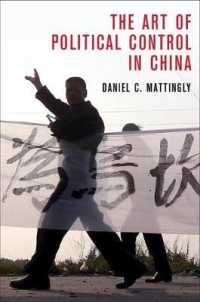- ホーム
- > 洋書
- > 英文書
- > Literary Criticism
Full Description
This volume focuses on the nineteen elegiac poems of the Appendix Tibulliana, a series of little-known Latin elegies transmitted as Book 3 of the Corpus Tibullianum. Although it is accepted that they are not the work of Tibullus himself their actual authorship remains unclear and has been hotly disputed: they are notable especially for containing work attributed to Sulpicia, who may be the only female Latin poet we know of from pre-Christian antiquity.
Though admittedly somewhat obscure, this volume argues that the elegies of the Appendix Tibulliana have been unjustly overlooked in traditional scholarship: rather than concentrating on what we don't know both the Introduction and the Commentary focus instead on broader contexts of discussion. The Introduction examines not only stylistic and textual matters, but also the genre of elegy, its main practitioners, poetic communities, and gender roles, while the Commentary examines whether and how the poems fit into their cycles, into the Corpus Tibullianum, and into the genre as a whole. Close reading of the individual elegies reveals that they have a lot to teach us, especially in light of the question of women as authors in antiquity and the notion of mutability of identity. Not only do they call into question the social and legal status of the participants in a 'standard' elegiac relationship and play with the gender norms of the actors and the genre, they also destabilize the commonly-held notion that elegy is personal poetry, rooted in autobiographical events experienced by one individual author. These valuable insights, more broadly applied, may have important consequences for traditional understanding of what elegy is and does.
Contents
INTRODUCTION; TEXT; COMMENTARY; ENDMATTER





